This is a long analysis so I’m going to break this into a bunch of parts. I don’t know how many yet, but I’ll put links to each part at the top and bottom each part as they come out. I hope you enjoy: Part 2 | Part 3 (not up yet)
Before Hiccup becomes chief a lot of things happen and I think that what stands out to me most, maybe because of my recent obsession with the choice of leadership (Plato’s Republic) and the rise of Kings (my former literature in antiquity class is getting to me), is Hiccup’s rise to power.
I want to start by examining how Hiccup gets treated as the sole heir to the Berkian throne in HTTYD. (Side note, in Norse tradition, being the child of the chief didn’t guarantee your succession of the chiefdom throne, but since Berk’s throne has been run by the Haddock family for six generations and Hiccup was set/did become the next chief, its a good bet that he was set to inherit and is sort of a ‘prince’ in Berk).
Starting with Stoick and the townspeople: Hiccup is seen as, well, a mistake that’s unaccounted for. He has strong parents, and a strong bloodline, but is physically weaker than his peers and notably small in size. A runt, so to speak. As such (or maybe because of how Valka was taken from him), Stoick is overly protective of Hiccup, but that protectiveness may have been what held Hiccup back from being great before the events of HTTYD1.
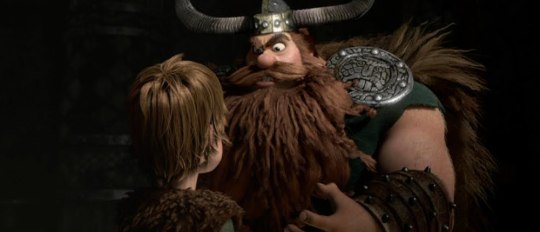
Hiccup, during an attack and even after, seems to be kept locked up or under a watchful eye. Just looking at the first dragon attack we see, everyone tells Hiccup he should be inside and his father is especially angry, asking the townspeople who let him out, as though he should be behind a locked door. Hiccup tells Gobber, the only one who will listen/converse with him normally, that his father is making a mistake, that Hiccup can make his mark if they’ll let him and Gobber kind of blows him off, saying Hiccup has already made plenty of marks. However, Hiccup is right (though not because he is an especially tough Viking). I think that he may be right because Hiccup learns from his mistakes quickly, makes fast adjustments, and improves vastly based on information gleaned at a moment’s glance. Take, for example, the creation of Toothless’ tailpiece. The first incarnation is simple but perfectly sized for Toothless’s tail, even though I highly doubt that Hiccup was allowed to measure it with a ruler of sorts. Quickly, Hiccup learns that the direction of the tail changes Toothless’ flight pattern and so, in the second incarnation, he develops a pull system. In the short time between Stoick leaving and his return, Hiccup he’s developed a working harness. Moreover, in their first real flight with the working harness, when the cheat sheet is lost, Hiccup is quickly able to compensate, learning to quickly adjust to Toothless’ moves. Enough so that in the near blindness of the fog surrounding the dragon nest and darkness of the cave, Hiccup can easily change the movement of the tail wing to go the direction Toothless wants. Essentially, Hiccup is not only smart, but quick to adapt, and able to apply varied skills and knowledge to new situations–something many of the others lack initially (such as the twins aiming for chaos, Snotlout just hitting and hiding, or Astrid’s hit first talk later approach).
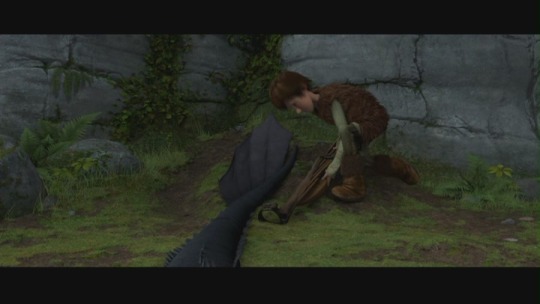
Sure, Hiccup’s first attempts may be rough, but his improvements, should he be allowed to make them, are quickly made and vastly improve most any situation. Take a look at the first episode of Dragons: Riders of Berk, How to Start a Dragon Academy. In it, Hiccup is able to turn the dreary situation around in roughly a day and a half when everyone else was of the opinion to either (1) live with the way things are or (2) get rid of all the dragons. But Hiccup sees a way to turn the dragon’s natural way of doing things into a tool for improvement–getting dragons to help fish, help plow fields, fertilize, etc. However, no one in town, before the events of HTTYD1 that is, allow him to do that. Why? Because he’s different and his methods are different. Let me explain.
There’s a comedic story that I heard about a daughter asking her mom why she always cuts the turkey in half before cooking it on Thanksgiving. Her mother says it’s because that’s how her mother did it and she supposes that it tastes better like that. The daughter calls up her grandmother and asks why she cut the turkey in half, to which the grandmother answers that she also did it because her mother did it that way and she supposes that the turkey cooks faster that way. Now, with all three of them on the phone, the daughter calls her great grandmother and asks why the great grandmother cut the turkey in half Thanksgiving. The grandmother says it because her oven was too small for the whole turkey when the grandma was growing up. That’s two generations that cut the turkey in half before cooking it and why? because that’s how it was done before and they never thought to question it. Instead, they did it because that’s how those before them did it and made an assumption about the reason for cutting the turkey that seemed most logical to them. That happens all the time without one noticing, and it’s happening in Berk with Hiccup–Stoick tells us so: “From the time he could crawl, he’s been… different. He doesn’t listen. He has the attention span of a sparrow. I take him fishing and he goes hunting for trolls! When I was a boy, my father told me to bang my head against a rock and I did it. I thought it was crazy, but I didn’t question him. And you know what happened? That rock split in two. It taught me what a Viking could do, Gobber. He could crush mountains, level forests, tame seas! Even as a boy, I knew what I was, what I had to become. Hiccup is not that boy.”
Hiccup is different because he doesn’t just follow blindly down the path of tradition–he thinks, adjusts, and often creates a new path not because a new path is needed or because the old way doesn’t work, but because there could be a better way.
Getting back to the main point, by Stoic keeping Hiccup inside (keeping Hiccup from cleaning up with the townspeople or putting out fires, etc.) may keep him safe but also limits Hiccup from an important learning opportunity. Firstly, it keeps Hiccup from important interactions with the townspeople, interactions that might have made it easier for him to get along with them like allowing him to clean up a mess he made, showing that he’s not just a screwup but able to accept and take responsibilities for his actions (important aspects for a future leader), but Stoick doesn’t let him clean up so they only see the first half. Secondly, it lowers Hiccup’s affinity for Berk. It makes him want to run away and not just because no one listens to him or expects anything for him. He runs because he doesn’t want to be locked away. It’s no wonder then that when Hiccup has to choose between pleasing the townspeople that have ignored him his whole life and killing dragons–dragons that allow him to be free, that listen to him and give him affection–that Hiccup chooses the dragons. Other’s would have chosen to appease the village, especially because dragons have killed/maimed a lot of the townspeople and limited expansion based on consumed food supply alone, but Hiccup’s affinity with dragons, at least at the start, is higher than with people. (Though I theorize that there is a deeper reason than just this psych-101 idea. That aside…)
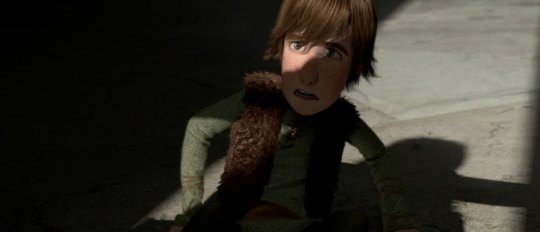
From this first interaction alone, one can see Stoick’s protectiveness is a limiter but it goes beyond that. In the Great Hall meeting when Gobber and Stoick are talking, Gobber mentions that training the requites will what?
- Leave Hiccup with a lot of alone time
- Leave him around a lot of sharp/heavy objects
- Leave him around a lot of raw materials.
From the previous scenes regarding Stoick’s (and town’s) treatment of Hiccup we can guess that
- Stoick doesn’t like Hiccup being alone/unprotected (responding to leave Hiccup with a lot of alone time)
- Stoick doesn’t like Hiccup being around anything potentially dangerous (responding to leave him around a lot of sharp/heavy objects), adding to that, maybe Hiccup is so small because he’s been kept from muscle training
- Stoick has no faith in Hiccup’s inventive skills and doesn’t want him making anything (responding to leave him around a lot of raw materials)
What reinforces this idea of Stoick’s protectiveness holding Hiccup back is how Hiccup begins to advance when Gobber, who is more of a free-range parent, is put in charge. Hiccup starts to exceed expectations by leaps and bounds. Why? Largely due to Hiccup’s own aptitude but also thanks to Gobber’s allowance of him to grow apart from the limits his father placed. Gobber doesn’t for Hiccup to stay indoors–in fact, Gobber encourages him to engage (such as the fireside dinner with the recruits). And when Hiccup doesn’t want to engage, Gobber doesn’t comment or try to force him into it (like when Hiccup leaves the fireside dinner early). This is very different from Stoick’s approach of always trying to force Hiccup to engage or disengage at his command.
We see Stoick has tried in his own way (on his own terms) tried to provide a path for Hiccup to follow and achieve the three things I’ve mentioned. The first way is having Hiccup study blacksmithing–a job that requires a lot of skill both socially and physically.
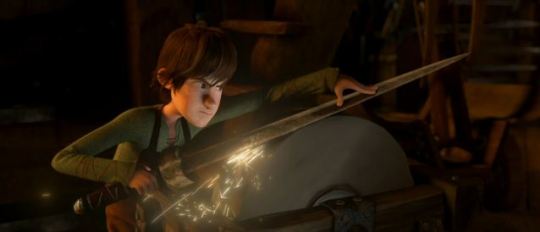
Hiccup says that he’s been apprenticing as a blacksmith under Gobber since he was small (essentially young). Blacksmithing requires physical strength (after all, you’ll be pounding metal), great skill and precision for creating things, and social skills (because blacksmiths often have a lot of interaction with the local people as metal workers). Blacksmithing was an important role in Viking tribes (enough so that there was a god associated with the skill, Völund). Blacksmiths were generally revered (though sometimes distrusted) as they had knowledge normal people did not (such as forging blades of different qualities with the same materials). As an apprentice to Gobber and in learning the trade, Hiccup would have to regularly take orders from the townspeople, learn what they need and why–training that will be useful to him as a future leader. Moreover, if he’s pounding metal and shaping it, he’s sure to build muscle and become skilled with details whether he knows that consciously or not. Sure enough, Hiccup is actually very skilled, hence his ability to create the first of Toothless’ tailpieces in a single night.
However, despite what I would guess to be fairly good blacksmithing work done by Hiccup, he is still largely ignored by the townspeople and his peers. Enough so that when Gobber and Stoick are talking in the great hall alone, Hiccup is able to leave the town and search across the island, in the forest, by himself–something that was probably more dangerous than the movie lets on even if no dragons seem to be around.
Summarizing what I’ve formulated in this analysis thus far, Stoick is overprotective and that overprotectiveness has limited Hiccup from:
- Being able to connect well with other people in the village, which is important to any leader (future or current)
- Prevented the development of his already incredible aptitude for leadership and invention.
- (Potentially, this protectiveness could be the reason Hiccup has less muscle than many of his peers since Stoick doesn’t want Hiccup to be around heavy objects)
Interestingly, these three things that Stoick has limited Hiccup from becoming early in the series are the three things that Stoick seems to want most for Hiccup–connection/respect from people, leadership aptitude, and physical strength. However, because Stoick cannot see how Hiccup might be able to achieve those things in his own way, Stoick tries to force Hiccup to achieve them on his terms–example, their deal (”you walk like us, talk like us, you think like us” (Stoick, HTTYD1).
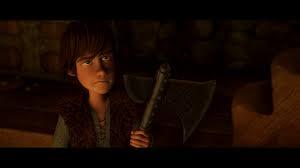
Part 2 | Part 3 (not up yet)
